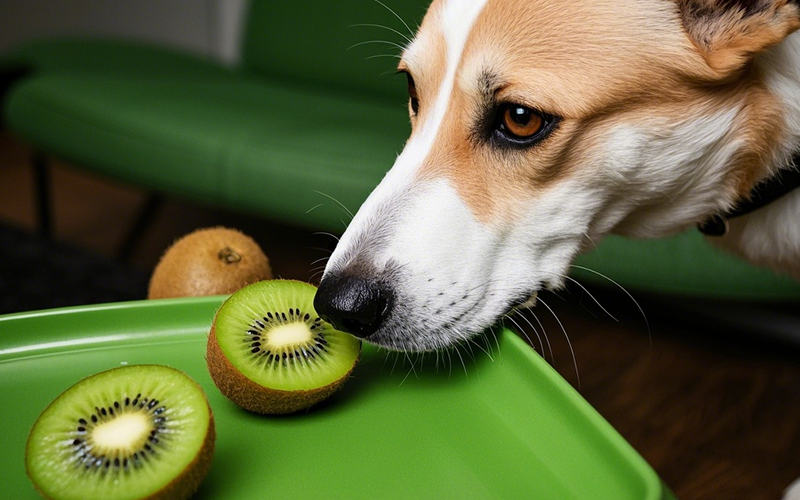Can Dogs Eat Kiwi Fruit? Here's What You Need to Know
- 28 Mar 2025 15:11
Kiwi fruit is a delicious and nutritious treat for humans, but is it safe for dogs? While the answer isn't a straightforward "yes" or "no," there are important factors to consider before offering kiwi to your furry friend. Let's explore the benefits, potential risks, and guidelines for feeding kiwi to dogs.

The Benefits of Kiwi for Dogs
Rich in Nutrients
Kiwi is packed with essential nutrients like vitamin C, vitamin K, fiber, and antioxidants. These nutrients can help support your dog’s immune system, digestive health, and overall well-being. Kiwi is also known for its potential to boost skin health and help maintain a shiny coat. 🍊High in Fiber
The fiber in kiwi can help with your dog’s digestion and promote regular bowel movements. It may be especially helpful for dogs that struggle with constipation. The high fiber content also makes kiwi a good option as an occasional treat to keep your dog feeling full. 🥑Low in Calories
Kiwi is a low-calorie fruit, making it a great choice for dogs who need to maintain a healthy weight. It's a refreshing and guilt-free snack when served in moderation. 🐾
The Risks of Kiwi for Dogs
Potential for Digestive Upset
While kiwi is generally safe in small amounts, some dogs may experience digestive upset, including vomiting or diarrhea, if they eat too much. This can be especially true for dogs with sensitive stomachs. It's important to introduce kiwi gradually and monitor for any signs of discomfort. ⚠️Choking Hazard
The skin of the kiwi can be tough and fibrous, posing a potential choking hazard. While the flesh of the kiwi is soft and easy to eat, the skin can be harder to digest. If you choose to feed your dog kiwi, always peel the skin and cut the fruit into small, bite-sized pieces to reduce the risk of choking. 🍉Allergic Reactions
Though rare, some dogs may have an allergic reaction to kiwi. Symptoms may include itching, swelling, or hives. If this happens, stop feeding kiwi and consult a pet health professional. 🐕🦺High Sugar Content
While kiwi is lower in sugar than some other fruits, it still contains natural sugars that could contribute to weight gain or blood sugar spikes if given in large quantities. Be mindful of how much you offer, especially for dogs with existing health conditions like diabetes. 🍬
How to Safely Serve Kiwi to Your Dog
Remove the Skin
The skin of the kiwi is tough and can be hard for dogs to digest. Always peel the kiwi before offering it to your dog. This will make it safer and easier for them to eat. 🍽️Cut into Small Pieces
To prevent choking, cut the kiwi into small, bite-sized pieces appropriate for your dog’s size. This will make it easier for them to chew and swallow safely. 🐾Introduce Slowly
As with any new food, introduce kiwi to your dog gradually. Start with a small piece and monitor how your dog reacts. If they show any signs of digestive upset, it’s best to avoid giving them kiwi in the future. 🥣Serve in Moderation
Kiwi should only be an occasional treat, not a regular part of your dog’s diet. A few small pieces once in a while are sufficient. Overfeeding kiwi could lead to digestive problems or contribute to weight gain. 🍏
What to Do if Your Dog Eats Too Much Kiwi
If your dog eats too much kiwi or experiences any symptoms like vomiting, diarrhea, or lethargy, monitor them closely. If symptoms persist or if your dog shows signs of severe discomfort, contact a pet health professional right away. For immediate assistance, you can always reach out to PettureX for a 24-hour online consultation. 📱
The Bottom Line: Can Dogs Eat Kiwi?
Yes, dogs can eat kiwi, but it should be given in moderation and with caution. Kiwi is packed with vitamins, fiber, and antioxidants, making it a healthy occasional treat for dogs. However, it's essential to peel the skin, serve small portions, and monitor your dog for any adverse reactions. If you have any concerns or questions, PettureX is a great resource for 24-hour online consultations to ensure the health and safety of your pet. 🌿🐶
Related

Why is Regular Dog Grooming So Important?
- 21 Jun 2025
Can Dogs Eat Kiwis? A Vet-Approved Guide to This Fuzzy Fruit
- 10 Jun 2025
Can Dogs Eat Curry? Unpacking Risks, Benefits, and Safe Alternatives for Your Canine Companion
- 3 Jun 2025
Can Dogs Eat Cooked Carrots? A Crunchy & Colorful Canine Query!
- 29 May 2025
Can Dogs Eat Cooked Cabbage? Unveiling the Crunchy Truth for Your Canine!
- 29 May 2025
Can Dogs Eat Citrus? Peeling Back the Zesty Truth for Your Pup!
- 28 May 2025
Can Dogs Eat Cinnamon Applesauce (A Little Bit)? The Sweet and Spicy Truth!
- 28 May 2025
Can Dogs Eat Chorizo? Sizzling a Warning for Your Furry Friend!
- 27 May 2025
Can Dogs Eat Chili? A Spicy Topic for Canine Consumption!
- 27 May 2025
Can Dogs Eat Raw Chicken? Unveiling the Risks and Realities
- 26 May 2025
